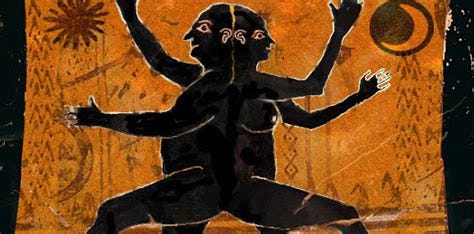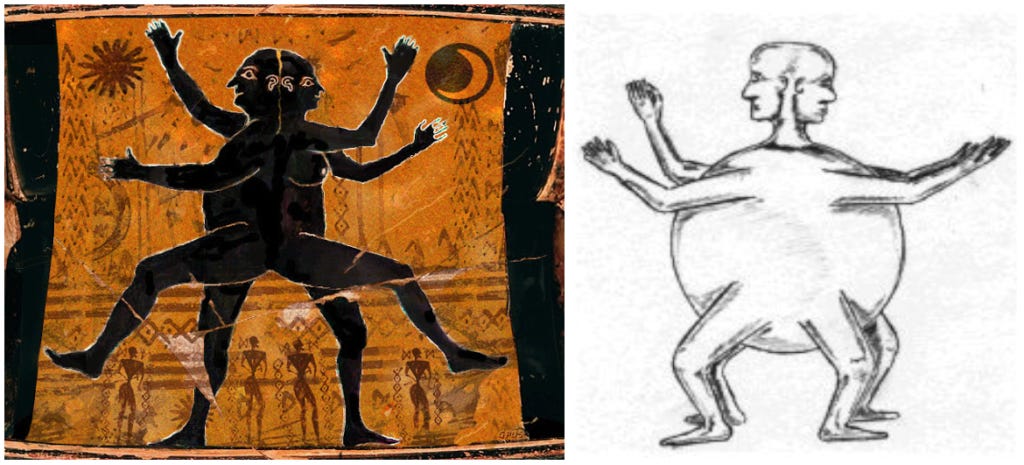Marriage is, perhaps, our most socially accepted norm. Marriage is expected. Marriage and a family. Sure, there are biological and survival reasons for this but in our modern world, let’s be honest, marriage is most commonly the aspiration of romantic love.
Ah, to find our other half, the one who completes us! . . . . hmm…. Let’s take a look at this.
This idea of not being whole unto ourselves comes from the Symposium by Plato, which is a conversation about love led by Socrates. In it, Aristophanes tells us that in the beginning, humans were round with four hands and four feet, sharing the same head but with two faces. These round humans came in three genders: both sides female, both male, and another that was one of each. Fearing their strength, Zeus divided them with his lightning bolt. The tragic result is that humans have since wandered the earth looking for their other half and never feeling complete. Symposium actually says a lot about love, yet the idea of finding our other half seems to have resonated with modern humans more than any other.
Even the revered Pierre Teilhard de Chardin wrote the following (in The Phenomenon of Man, written in the ‘30s and published in 1955):
Love alone is capable of uniting living beings in such a way as to complete and fulfill them, for it alone takes them and joins them by what is deepest in themselves.
Yet, it seems to me this is the primary reason why marriages fail: the expectation that another person will make us whole. Expecting our partner to always understand us, will want what we want, and feel as we feel. And this, of course, is impossible.
Over 1/3 of marriages end in divorce. In the age 55 to 64 group, the numbers are even higher: approximately 43% of people have been divorced. That’s almost one in two! The thing is, fewer folks are getting married these days. And those that do marry, wait longer. Of those who wait longer, fewer get divorced.
Perhaps Teilhard de Chardin’s quote is simply misunderstood.
Perhaps what he meant is that we are all human. Deeply human. And if we can see past our projections of what we want the other to be and embrace them fully as they are, then indeed we would be joined by what is deepest in ourselves. Compassion for our own humanity. Our foibles and faults and shortfallings, as well as everything that is good.
This is where 1 Corinthians 13 comes in, and this is likely read at weddings more than anything else:
Love is patient, love is kind. It does not envy, it does not boast, it is not proud. It does not dishonor others, it is not self-seeking, it is not easily angered, it keeps no record of wrongs. Love does not delight in evil but rejoices with the truth. It always protects, always trusts, always hopes, always perseveres.
Such love is indeed the best and deepest of ourselves, is it not? The above is only verses 4-7; the rest of the chapter is worth reading too.
You know these verses as well, I’m sure. These include: “When I was a child, I talked like a child, I thought like a child, I reasoned like a child. When I became a[n adult], I put the ways of childhood behind me.” If we apply this to marriage, these verses are just as important as the former.
Marriage requires us to grow up, to mature, to become responsible for ourselves. Our spouse is not supposed to take the place of our father or our mother. Nor should our parents continue to take care of us as they did when we were still young, in school, or under their roof. We need to become our own person and have an awareness of that person. (Our own likes, dislikes, strengths, weaknesses, etc. Who are we and what do we bring to the relationship?)
My favorite way of thinking about this has to do with food. Food is, after all, an essential need. It is also what we most commonly associate with home. We all need to know how to feed ourselves, to cook for ourselves. Personally, I really like my cooking and I’m quite particular about what I eat. What I need from a partner then is someone who contributes something I don’t cook, cooks it better than me, or hadn’t even thought of eating, while still meeting my dietary needs and emotional preferences. Someone who makes my meal (my life) better. I make great pasta and kick-ass salads and always have nibbles for appetizers. Perhaps your specialty is a great protein or veggies and maybe a dessert or always bring the wine. Alone we both have good meals. Together, we have GREAT meals. Note: this example isn’t literal (though I think it’s wonderful when it is), but rather an example of what two people mature people bring to their union. You can both survive on your own and maybe even do so quite well, but together is just better in every way.
Remember the movie Runaway Bride with Julia Roberts and Richard Gere? (A friend told me recently that I hadn’t used a movie reference in a while so here you go! :) Julia’s character was engaged four times and each fiancé believed they knew who she was, when in fact they had molded her to what they wanted her to be and she (not knowing herself) adapted to their needs. This is not a marriage that can last. When Richard’s character sees her for the confused, shape-shifting person that she is and still falls in love with her, Julia realizes it is finally time for her to take responsibility for herself and figure out what she wants. Only after she has made some authentic strides in this direction is she able to give herself honestly to a relationship because she finally feels worthy, she knows what she brings to the table (so to speak).
Maturity, self-responsibility, and self-knowledge are key. With these things, we have our best chance at making and maintaining a marriage that demonstrates the love spoken of in 1 Corinthians and by Teilhard de Chardin.
I’ll talk about expectations more in another post. For now, one last thing. I came across the following clip while searching for the Runaway Bride trailer. Lisa Rinna and Harry Hamlin are folks I know nothing about but … They have been married for 26 years and have nothing in common. Zero. They don’t eat the same foods, read the same books, watch the same shows, listen to the same music – nothing. They are completely different people with different likes and interests. So what makes their relationship work? “We’re curious.” They are interested in what each other does and thinks and feels. They admire each other, respect each other, and are kind. (this last part is from a People interview) Take a look at what they say in explaining their marriage:
So let’s talk. What do you think about soulmates and finding your other half? What do you think about the idea of knowing yourself and being a little older before you marry? If you are happily married and have been for quite a while, what’s the secret to your success? I’d love to hear from you.
If you like this post, please click the ❤️ ! It makes me happy to know when I’ve written something that resonates. This post is public, so feel free to share.
Thank you for reading!






My first marriage was a disaster, but I have two beautiful children because of it. After my divorce, I was a bit despondent. I remember talking to God one morning--I was 32 and felt like used goods. Who would want me? And would I want someone who also had “baggage?” I asked God to send me someone who would serve Him alongside me. I know that sounds like a crazy prayer, but I asked and He delivered.
Mike and I have been married 14 years. We had similar experiences in our first marriages, so we both understood the same hurt. His personality is very different from mine, but enjoy doing some of the same things. We have to step back and regroup sometimes when we don’t seem to be on the same page, but I think what makes us work is that we understand what a gift this relationship is and we are thankful for each other. It makes it easier to get over the small stuff.
I’ve always felt like a whole, complete person. I’ve never cared if I had a traditional marriage or kids. The first time I got married it was in a state of total grief after my father died. It was a huge mistake. The 2nd time, we were both on a horse when we met each other. We are both avid equestrians and I liked his witty humor. He was well read, cerebral, and had lived all over the world. He was 51 and had never been married. 19 years later it is still a work in progress. We, too, are both curious. We spend a lot of time asking questions and looking for answers.